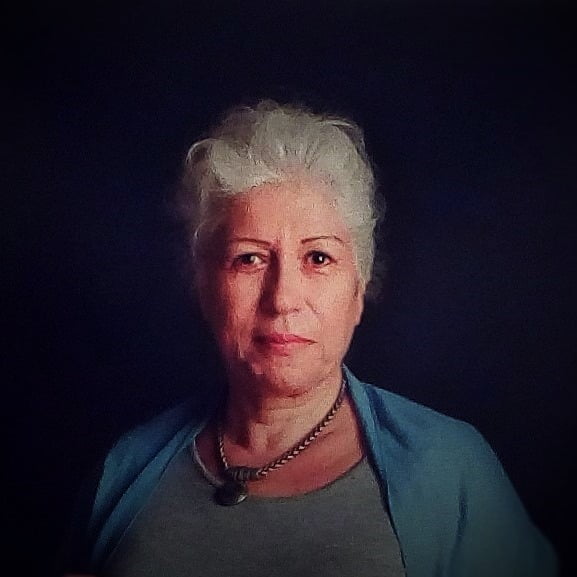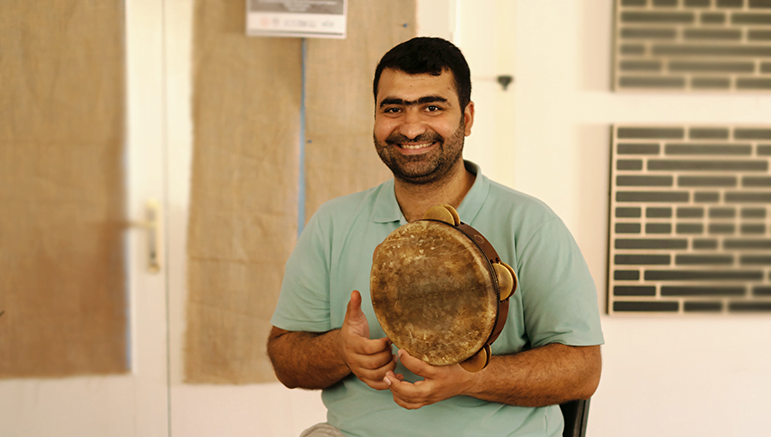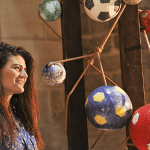Haneen Chorus, a women’s chorus, was founded by Raja Banout in Gaziantep, Turkey, in 2015. Syrian women, many of whom had never sung before, came together to rehearse traditional songs, to connect with and support each other, to explore and preserve their rich musical heritage. The concerts they hold create community with their host country, introduce audiences to Syrian music, and most importantly empower the women who sing. Raja’s aims to create a chorus everywhere there are Syrian women.
I believe that to create change, you must begining at the grassroots level
What first strikes me about Raja Banout is her dark eyes, intent and sharply intelligent. in a face with soft features which switch quickly from serious to smiling, to laughter and back again. The fingers of one hand, some with silver rings, rest around her neck, cup her face or come forward, often joining the other in sculptural explanation. Raja radiates warmth, and the strength of a personality which has created eight women’s choruses in six countries is immediately apparent.

How did the idea for a chorus come about? How challenging was it to set up the first one and what kinds of challenges did you face?
I had had previous experience with a chorus when I lived in Damascus. Through the association I had established whose vision was ‘change through art’. It was aimed mostly at social engagement, as the gateway to more democratic, civic activity within the community. My idea for one of the projects was to create a chorus for women over fifty. The model was to create small groups – a way of building trust, as it’s easier to relate to each other – who would sing together.
I believe that to create change, you must begin at the grassroots level, so I wanted to use the chorus as a platform for change: for changing behaviour, changing culture and understanding. This is how people start to change their mindsets – through social activities, learning about teamwork, democracy and working together.
On your website it says you focus on ‘women above the age of 45’. As an older woman myself, I find this wonderful, and unusual. Can you say a little about why this is?
When I was in Gaziantep, in Turkey, I noticed that a lot of effort and activities were directed towards men and young people. Men can do things outside more easily, but I felt that women were left out. There was the language barrier, and often they were stuck at home and becoming depressed, feeling that there was nothing for them. I wanted to do something special, to help them be more engaged and integrated, to lift their spirits.
I don’t feel there’s been enough care or interest in women of this age; they are not expected to contribute much to society. I wanted to encourage them to participate, to make use of their experience; they have so much to offer.
Getting women together is a very powerful thing. Do you see women as a force for change?
Definitely. Especially in war, or at times of crisis, women are more capable; they are the frontline.

When you started a chorus, in Gaziantep or in Berlin, had many of the women not sung before, apart from you? Would they mostly have sung at home, in private?
None of the women had sung before, in fact. But I chose a traditional song, very lovely and very close to people’s hearts; one that was easy to sing. They knew it well, and they sang it well.
Part of this is about memory and activating memory; we need to think about our memories, we need to remember things, to feel ourselves Syrian again. They stole our country; they cannot steal our memory. That’s why I concentrated on traditional songs. Also, it was important to let the new generation know our songs, and where we are.
A good singing voice is less important in Haneen than building trust and relationships and emotional support, but might women also discover they have a strong singing voice, discover their own voice? Both literally and figuratively. This must be extraordinary to witness?
When you find your voice, unconsciously you have already begun the process of change. It was like this for many of the women: they found their voice, they discovered it. This made them feel empowered. It had an effect. So, more recently, younger people have become interested and want to join the chorus.
Being in this group changed these women. It boosted their confidence, especially when they stood on stage in concerts and heard the audience’s applause. It changed their perception of themselves. Five of them found jobs, because they had gained so much confidence, they believed in themselves. It changed their lives; they made relationships and became involved in everything around them.
How did you manage to convince them? It’s not easy to convince women to come and sing on stage, to sing in public – especially women in our community, and especially in some of our communities. It’s not only the fear of singing but the social restriction. You need not only to convince the women, but their husbands and family that it’s OK for them to do it.
It was based on the credibility I had, with other women, the trust they had in me. They knew they were in safe hands, that they would not be used, or abused. And then of course it’s word of mouth.
Building trust is one the main pillars of Qisetna, too. How did you connect with people, and convince them you were genuine?
At university, I studied agriculture and then I did a master degree in business management. I was intrigued by the Japanese style of management, which assumes almost a parental role. This seemed to me the best method to adopt, and I took it to the extreme, as if I were a compassionate parent. This worked for me.

Can you give us an idea of the range of songs you work with?
In the Haneen project, we try to represent all ethnicities. We use songs from all ethnic backgrounds, from region to region, so that we can sing in all the languages spoken in Syria: Kurdish, Assyrian, Arabic and others. I wanted us to be able to represent or reflect the whole of Syrian culture and heritage, from north to south, from Hasakah to Dara.
How does it work, practically, to sing in different languages? It must mean women are learning about each other’s heritage within the group, too?
Practically, of course, we couldn’t learn the whole language. We learned the lyrics, which were written down phonetically in Arabic so that we understood what we were singing and learned some vocabulary. Of course, there were challenges: for instance, some women felt the northern dialect was too hard, they didn’t think they could do it. But in fact, when they started to sing, they managed it. And this made them appreciate the wealth of Syrian culture and also know more about it. This was one of my aims for the project, that women should learn about each other’s culture and language, exchange knowledge and information.
Which will bring them closer together, of course. How do you choose the songs?
First, I choose them from our common songbook, from all the available traditions. Then I go in deeply, to the very old songs. The main thing is to have one song from every region to sing at the concert. But now, after six years, it seemed a shame to concentrate on one area only; for example, now we are concentrating on Latakia songs. Because there are so many amazing songs everywhere.
You studied agriculture and business, but when you started working, it was in music and songs?! Do you have a musical background?
No, I focused on my interest culturally. It wasn’t musical knowledge so much as a passion for music and for culture that drove me.
I feel art and culture should play a pivotal role. I encouraged my three daughters to be involved in culture and the arts. One is a professional ballerina, another is a professional violinist and the third is an artist, a painter. I nurtured their passions. This is what I feel is most important, whether it’s a hobby or a professional pursuit.
Can you give us a feel for the range or texture of songs you might sing? Traditional songs like marriage songs, weeping songs and lullabies? What other kinds of songs might you include? Do you try to include an emotional range of celebratory songs and sad songs?
Syrian music is very rich. We have a goddess of music, from ancient times. The first musical notation was made in Syria, from an area called Ugarit. Within one area or even one city, there are many varieties and styles of songs.
We have so many types of music, for special occasions, for marriage. There are songs for when women gather together. There are beautiful lullabies that mothers sing to their children. There are different styles, like ululation, or there’s music without words. Songs for funerals, like eulogies. The idea of singing for someone we love who has died is more widespread in Christian communities; in Muslim culture, it’s not as acceptable to cry, to show emotion and mourn, but in Christian communities it’s almost celebrated. Maybe this comes from the resurrection of Christ. The Shi’a Muslims have their own songs, too, but they tend to be about mourning the deaths of the grandchildren of the Prophet only.
Who are you singing for, if it’s possible to say? For yourself, for friends or family, for the country or people you have lost?
[a short silence]
… Maybe all of them, but mainly for myself.
I want to talk about the extraordinary video, which was what first caught Qisetna’s attention, but first of all, how did lockdown affect the chorus?
To answer you, I need to continue that trip, from Gaziantep to America… Because it’s all connected…
In 2014, I was granted asylum status on human protection grounds in Germany. In 2015 I went to Gaziantep because I wanted to be with other Syrians. There are about 400,000 Syrians there now, they form the majority of the population. In 2014, I spent a year there; I formed the first group. And it was a life-saving group; people said this was the only good thing that had happened to them after they left their country. It made them feel optimistic again.
We were talking about who we sing for, who our audience is. What happened with the women from the local community, the Turkish community? Was there any connection with them?
Sometimes we didn’t have a place to rehearse in. So we went to the local gardens, or streets or whatever. So they knew us and connected with us, it was like a celebration wherever we were. We would hold a festival or a performance, and people would come out on the streets. One woman said to me: “There is a war in your country, and you are singing?” I answered: “Yes. Because we are suffering, we have to sing.”
[silence]
And of course, we sang Turkish songs as well, which connected us.
How did the video come about? It is so immediate, so intimate. What was the process? How did you find all these women? How was it filmed? It’s like a defiance of lockdown, a defiance of loneliness, of silence.
Many of the Syrian women from the original chorus in Gaziantep made the crossing to Europe in 2015, and they were sad and sorry to lose their group. The journey was very dangerous. On this journey, on their boat, those women tried to sing our songs. It gave them peace, it gave them power to reach the other side of the sea.
By then I was in Germany. I was still in touch with these women, and they wanted to sing again, but they didn’t know how. I said to them, “I will make a group wherever you are.” And that’s what happened. I made a group in Berlin. Then in Toronto, in Canada, in Dortmund, Germany. We have groups in German cities, two in Turkey, one in America, and in Helsinki and Switzerland.
During the coronavirus crisis, people felt very lonely and needed to do something. So, we made a mosaic of women, from twelve groups, from all over the world. We rehearsed with one woman from every place during lockdown. We decided to try doing this project. And we did it.
When you were in Turkey, you were able to rehearse together. But now you are scattered all over the world. How do you do this? How do you practise together now?
There are two kinds of practice now. There is the Haneen network practice, and the training of each group. Every group has a leader, a woman who is rehearsing them. Each group practises its own songs, but we are all in the same programme. A programme that I established and gave to all the groups to practise. We all trained together online.
There is usually a delay online, technically, with music. How do you overcome this kind of technical problem?
There is the physical training – stretching and opening the chest etc – then there is the vocal training, and at home, the women practise the exercises their facilitator shows them. And then there is the recording. Each individual woman records herself and sends it to the person who puts the music together.
And then, it’s all put together in post-production? Because it’s seamless…
Everyone was working on a volunteer basis originally, but now we need more technical people to do the specialist jobs. Now we need funding. And this will decide if we can go on or not.

We must talk about funding, but I wanted to ask first, how did you choose the women on the video, or did they choose themselves?
I am very sociable; I know a lot of people. Women come to visit all the time, so I have a wide social network. Many were already working with me in Gaziantep and they would come with other women, and introduce them, and I would welcome them. Others would hear about it… The main thing that encourages women, which I stress, is that they don’t need a good singing voice in order to join. The men often think it’s about learning the technique of singing together, but I make it clear that you don’t need to be a professional, and you can learn…
To go back to the funding. How do you manage, because of course there are so many groups and at the same time, it relies on one woman. Do you have to travel a lot?
I have always stayed in touch with the women in the choruses and am always liaising with them. Also, I have a core group I work with, and we stay connected, and continuously liaise with the women who are leaders of the groups, too, so no one is left alone… I make sure I go and visit them, I travel to see each group, but when I visit them, I stay over with friends and they stay over with me, so the cost is minimal. We are all friends. I have houses I can go to all over the world now.

Yes, it’s a company of friends…
Also, the whole organisation holds a 3-hour meeting every three months and we all talk. We have meetings for all the groups online, which is a huge benefit for our project. Sometimes there are a hundred women in the meeting…
I have just one more question really, about the concerts. How important are they? Both in terms of the audience and of the women who are singing?
The concert is important on many levels. The focus of this project is primarily social: for the women to get together, to support each other and feel that they belong somewhere. And ultimately, that helps them to integrate, because when they feel positive and that they’re doing something, they feel they have something to offer; they can be part of the community and show off what they are doing.
And singing on stage helps them become more vocal in their day-to-day life, too. It builds confidence. They participate in their surroundings, their community. First, they find their voice and then they claim their voice.
It’s also an opportunity for the local community to be introduced to our Syrian heritage and culture, which will add richness to their own culture.
Raja, where can we find you?
I want to say that on a personal level, I am still in shock that I had to leave Syria. So, working with other women in this way has really helped me to accept this fact. It’s been a kind of self-healing. These women saved me from depression and helped me through this difficult time – through what we are all facing as Syrians, and especially as Syrian women. I want to extend my thanks to these women.
You can go on the Haneen website and there’s also a Haneen Facebook page.

And if we wanted to form a group, here in England?
It would be great!
(shared laughter)
Really, we can do this in a few days…
You have another home now, here.
For sure. And my home is open to you, always.
I want to thank Lena Baurak enormously for translating so brilliantly.
You are very inspiring, Raja. We need someone like you, in these times, to give us hope and positive energy.
🌿




